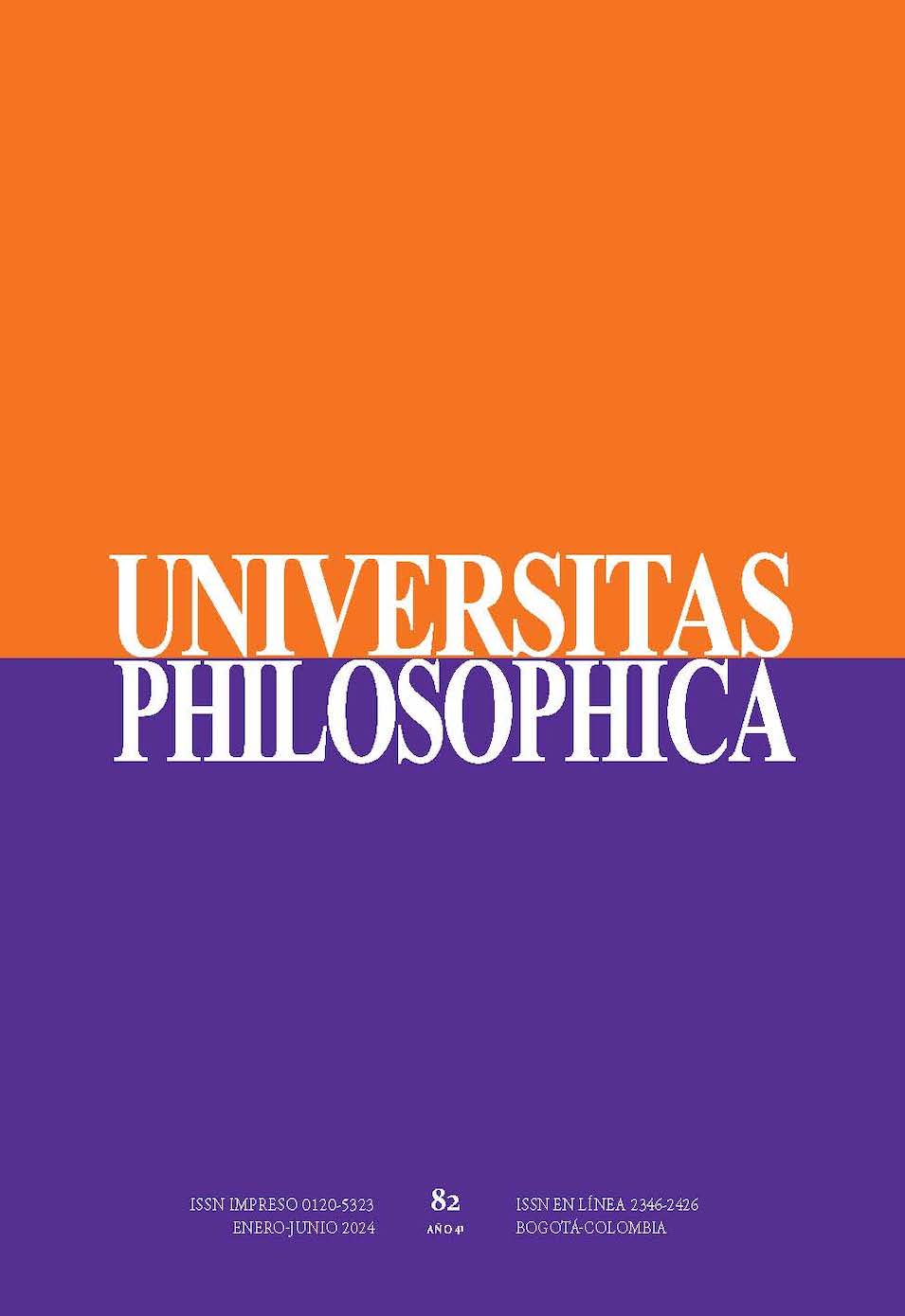Resumo
El mundo del ensueño y el mundo de la vigilia raras veces se oponen o se excluyen de manera tajante; más bien, una de las características de tal relación es la posibilidad de una inminente irrupción de uno en el otro. La tesis general de este artículo es que la tradición filosófica de Aristóteles a Husserl no cuenta con una orientación para acceder al fenómeno de los sueños que no privilegie la vigilia. Esta dificultad está detrás de una serie de problemas y paradojas que se pueden explicitar ejemplarmente mediante una aproximación a la teoría aristotélica sobre el dormir (hýpnon) y el soñar (enýpnion), en los tres tratados dedicados al tema en Parva naturalia. La tematización aristotélica es analizada y criticada de cara a una posible fenomenología de los sueños, de la cual ya hay algunos vestigios en Husserl y Heidegger, pero que se desarrolló sistemáticamente en Fink. El artículo propone que al reelaborar las “piezas faltantes” del acercamiento aristotélico, así como la prioridad que la primera persona tiene en la fenomenología, sería posible abrir una vía de exploración que lleve a pensar el sueño en la realidad de su efectuación concreta. Este enfoque permite evidenciar tres requerimientos fundamentales para pensar la fenomenalización del ensueño, a saber: el entrecruzarse de los mundos de la vigilia y del ensueño, la maximización y la móvil ordenación de las sensaciones durante el sueño y, finalmente, el afloramiento del reino afectivo. Estos tres fondos problemáticos ponen sobre la mesa la pregunta por los límites de la manifestación (de los ensueños) y, en ese sentido, abren un posible diálogo con la fenomenología francesa contemporánea.
Aristóteles (1955). Parva naturalia. D. Ross (Ed.). Oxford University Press.
Aristóteles (1987a). Acerca del sueño y de la vigilia. En Tratados breves de historia natural (pp. 257-276). Gredos.
Aristóteles (1987b). Acerca de los ensueños. En Tratados breves de historia natural (pp. 277-295. Gredos.
Aristóteles (1987c). Acerca de la adivinación por los ensueños. En Tratados breves de historia natural (pp. 295-304). Gredos.
Bachelard, G. (1993). El aire y los sueños. Ensayo sobre la imaginación del movimiento. FCE.
Barbaras, R. (2013). Introducción a una fenomenología de la vida. Encuentro.
Benjamin, W. (1989). Hacia una crítica de la violencia. En W. Benjamin, Obras, Libro II, vol. 1. Abada
Benjamin, W. (2011). Sueños. Abada.
Borges, J. L. (2016a). El otro. En Cuentos completos (pp. 439-446). Debolsillo
Borges, J. L. (2016b). Las ruinas circulares. En Cuentos completos (pp. 123-128). Debolsillo.
Castellanos, B. (2012). Los nombres del inconsciente en la filosofía griega. Problemata. Revista invernacional de filosofía, 3(1), 96-124. http://dx.doi.org/10.7443/problemata.v3i1.12228
Conrad, T. (1968). Der Traum. En T. Conrad, Zur Wesenslehre des psychischen Lebens und Erleben (pp. 57-72). Martinus Nijhoff.
Del Corno, D. (1988). Artemidoro. Il libro dei sogni. Adelphi.
Dodds, E. R. (1997). Los griegos y lo irracional. Alianza.
Fernández, M., & Vinagre, M. (2003). La terminología griega para “sueño” y “soñar”. Cuadernos de filología clásica: Estudios griegos e indoeuroperos, 13, 69-104.
Fink, E. (1966). Vergegenwärtigung und Bild. Beiträge zur Phänomenologie der Unwirklichkeit (1930). En Studien zur Phänomenologie 1930-1939 (pp. 1-78). Martinus Nijhoff.
Gallop, D. (Ed.) (2015). Aristotle on Sleep and Dreams: A Text and Translation with Introduction, Notes, and Glossary. Oxbow Books.
Gondek, H.-D. & Tengelyi, L. (2011). Neue Phänomenologie in Frankreich. Suhrkamp.
Heidegger, M. (1983). Die Grundbegriffe der Metaphysik. Welt – Endlichkeit – Einsamkeit. Gesamtausgabe, Band 29/30. Verlag Vittorio Klostermann.
Henry, M. (2015). La esencia de la manifestación. Sígueme.
Husserl, E. (1968). Phänomenologische Psychologie. Martinus Nijhoff.
Husserl, E. (1993). Krisis der europäischen Wissenschaften und die transzendentale Phänomenologie. Ergänzungsband. Texte aus dem Nachlass 1934-1937. Kluwer Academic Publishers.
Husserl, E. (2006). Späte Texte über Konstitution (1929-1934). Die C-Manuskripte. Springer.
Iribarne, J. (2002). Aportaciones para una fenomenología de los sueños. En Edmund Husserl. La fenomenología como monadología (pp. 369-395). Academia Nacional de Ciencias de Buenos Aires.
Lohmar, D. (2008). Phänomenologie der schwachen Phantasie. Springer.
Marion, J L. (2011). Reducción y donación. Investigaciones acerca de Husserl, Heidegger y la fenomenología. Prometeo.
Nancy, J. L. (2007). Tombe de soleil. Galilée.
Pace-Schott, E. F., Solms, M., Blagrove, M., & Harnad, S. (Eds.). (2003). Sleep and Dreaming. Scientific Advances and Reconsiderations. Cambridge University Press.
Patočka, J. (2004). El movimiento de la existencia. Encuentro.
Rabanaque, L. R. (2018). Un fenómeno elusivo: el dormir y los sueños. En F. Johnson, P. Mena, & S. Herrera (Eds.), ¿Hacia las cosas mismas? Discusiones en torno a la problemática claridad del fenómeno (pp. 159-192). Ediciones Universidad de la Frontera.
Rodríguez Fernández, G. (2015). Δείματα καὶ φόβοι: la pesadilla en la antigua Grecia [Tesis doctoral, Universidad de País Vasco]. https://addi.ehu.es/handle/10810/18531
Sepp, H. R. (2015). La producción de realidad. Una respuesta al artículo de Julia Iribarne sobre la fenomenología del sueño. Escritos de Filosofía, 3 313-328.
Sutton, J. (2009). Dreaming. En S. Robins, L. Symons, & P. Calvo (Eds.), The Routledge Companion to Philosophy of Psychology (pp. 522-542). Routledge. https://doi.org/10.4324/9780429244629
Warren, N. (2010). The Inner Night. Towards a Phenomenology of (Dreamless) Sleep. En D. Lohmar & I. Yamaguchi (Eds.), On Time - New Contributions to the Phenomenology of Time (pp. 273-294). Springer.

Este trabalho está licenciado sob uma licença Creative Commons Attribution 4.0 International License.
Copyright (c) 2024 Jorge Enrique Pulido Blanco



